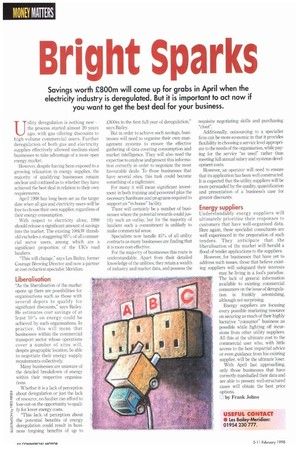right Sparks
Page 46

If you've noticed an error in this article please click here to report it so we can fix it.
Savings worth £800m will come up for grabs in April when the electricity industry is deregulated. But it is important to act now if you want to get the best deal for your business.
Utility deregulation is nothing new— the process started almost 20 years ago, with gas offering discounts to high-volume commercial users. Further deregulation of both gas and electricity supplies effectively allowed medium-sized businesses to take advantage of a more open energy market.
However, despite having been exposed to a growing relaxation in energy supplies, the majority of qualifying businesses remain unclear and confused as to whether they have achieved the best deal in relation to their own requirements.
April 1998 has long been set as the target date when all gas and electricity users will be free to choose their own supplier, regardless of their energy consumption.
With respect to electricity alone, 1998 should release a significant amount of savings into the market. The existing 100kW threshold excludes a staggering 95% of all commercial sector users, among which are a significant proportion of the UK's road hauliers.
"This will change," says Les Bailey. former Courage Brewing Director and now a partner at cost-reduction specialist Meridian.
Liberalisation
"As the liberalisation of the market opens up there are possibilities for organisations such as those with several depots to qualify for significant discounts." says Bailey. He estimates cost savings of at least 10% on energy could be achieved by such organisations, In practice, this will mean that businesses within the commercial transport sector whose operations cover a number of sites will, despite geographic location, be able to negotiate their energy supply requirements collectively.
Many businesses are unaware of the detailed breakdown of energy within their respective organisations.
Whether it is a lack of perception about deregulation or just the lack
= of resource, no haulier can afford to el
lose out on the opportunity to quali 2fy for lower energy costs.
7 "This lack of perception about
Q "3 the potential benefits of energy
deregulation could result in business forgoing benefits of up to
1.:800m in the first full year of deregulation," says Bailey.
But in order to achieve such sayings, businesses will need to organise their own management systems to ensure the effective gathering of data covering consumption and market intelligence. They will also need the expertise to analyse and present this information correctly in order to negotiate the most favourable deals. To those businesses that have several sites, this task could become something of a nightmare.
For many it will mean significant investment in both training and personnel plus the necessary hardware and programs required to support an "in-house" facility.
There will certainly be a number of businesses where the potential rewards could justify such an outlay, but for the majority of hauliers such a commitment is unlikely to make commercial sense.
Specialists now handle 45% of all utility contracts as many businesses are finding that it is more cost-effective.
For the majority of businesses this route is understandable. Apart from their detailed knowledge of the utilities, they retain a wealth of industry and market data, and possess the requisite negotiating skills and purchasing "clout".
Additionally, outsourcing to a specialist firm can be more economic in that it provides flexibility in choosing a service level appropriate to the needs of the organisation, while paying for the service "as used" rather than meeting full annual salary and systems development costs.
However, an operator will need to ensure that its application has been well constructed. It is expected that the utility suppliers will be more persuaded by the quality, quantification and presentation of a business's case for greater discounts.
Energy suppliers
Understandably energy suppliers will ultimately prioritise their responses to customers that have well-organised data. Here again, these specialist consultants are well experienced in the preparation of such tenders. They anticipate that the liberalisation of the market will herald a flood of tender applications to the suppliers.
However, for businesses that have yet to address such issues, those that believe existing suppliers will safeguard their interests may be living in a fool's paradise. The lack of general information available to existing commercial consumers on the issue of deregulation is frankly astonishing, although not surprising.
Energy suppliers are focusing every possible marketing resource on securing as much of their highly lucrative "consumer" business as possible while fighting off incursions from other utility suppliers. All this at the ultimate cost to the commercial user who, with little access to the best impartial advice or even guidance from his existing supplier, will be the ultimate loser.
With April fast approaching, only those businesses that have correctly marshalled their data and are able to present well-structured cases will obtain the best price options.
A by Frank Johns








































































































